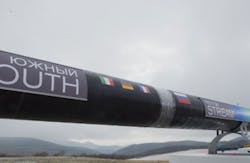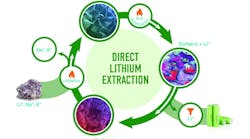The South Stream pipeline project that will see Russian natural gas flow to Eastern and Central Europe carried by pipes laid under the Black Sea and across the Balkans is moving ahead, as suggested after a meeting between Alexey Miller, chairman of the Gazprom management committee, and Dimitar Gogov, executive director of Bulgaria's largest natural gas distribution company Bulgargaz.
The two met at Gazprom's headquarters, where they agreed that work on the construction of the gas receiving facilities would begin in Bulgaria as early as next year. Miller and Gogov also discussed bilateral cooperation in the energy sector and possibilities for broader cooperation in other spheres, according to Pipelines International.
Last month the two countries signed a long-term contract for Russian natural gas supplies to Bulgaria. The document states that by 2022 annual gas supplies of up to 2.9 billion cubic meters should reach the southeastern European country via the traditional gas transmission corridor and the new South Stream gas pipeline.
South Stream is planned to transport natural gas from Russia across the Black Sea, into Bulgaria, where the pipeline will split into two. One of the branches will carry gas north-west to Serbia, Hungary, Slovenia and Austria. All these countries, plus Croatia, where another branch is planned to carry natural gas, have already signed intergovernmental agreements on the project. The southwest branch that was to transport natural gas to Greece and Southern Italy has been abandoned.
The section that will span from the Russkaya compressor station on the Black Sea coast to the Bulgarian coast will reach roughly 900 kilometers at a maximum depth of two kilometers. Its design capacity is about 63 billion cubic meters per year. Plans are for Russian natural gas to start flowing to Europe via the pipeline in the second half of 2015.
Meanwhile, Russia will keep asking the European Union to grant special status to the South Stream pipeline project. The country accounts for a quarter of all gas demand in Europe, with nations in Eastern and Central Europe heavily dependent on Russian gas. Russia's foreign minister Sergey Lavrov recently said that by receiving special status, the project would be exempt from European Union policy to separate gas production from gas distribution in EU member countries. He also warned that if the EU applied this policy to pipelines that were installed by Russia's Gazprom decades ago, it would mean that retroactive law enforcement is being applied and this would be incompatible with civilized norms. In addition, Lavrov accused the EU of trying to rob Gazprom of its European pipelines.
The EU has already granted such special status to another project, the Nord Stream pipeline, which is to carry gas via pipes under the Baltic Sea. Once South Stream is completed it will supply more gas to Europe than the Nord Stream, Russian news agency Interfax said, quoted by the Voice of Russia.


